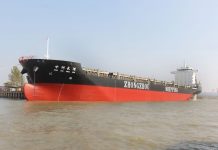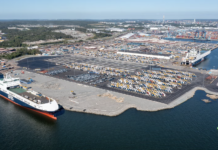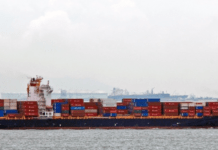
Alan Holland, CEO of Keelvar, an Ireland-based provider in intelligent sourcing optimization, explains to Container News how automation, digital systems and technology could ease the impact of the global port congestion and mitigate the supply chain disruption, while he also speaks about the next steps of the shipping digitalisation and automation.
- How automated systems could help in the ongoing global port congestion?
Labor shortages, limited capacity, heightened demand — these are just a few of the factors contributing to major port congestion. Automation cannot solve these issues, but it can transform how buyers and carriers manage freight and make better, faster decisions through volatility.
For example, we’re seeing an increase in off-contract spot bidding to secure new carrier agreements as real-time needs arise. For some of our customers, teams are now executing thousands of these types of operational, ad hoc bidding events annually where they are on the hook to secure capacity. As a result, they don’t always have time to competitively bid on all of these lanes or follow all the desired best practice steps.
Artificial Intelligence (AI)-fueled automated systems offload time-consuming tasks associated with the spot bidding process like initiating events, inviting and tracking bidders, analyzing bid data, recommending optimal award decisions, managing pricing updates, auditing and more. This makes it easier to create competition even in these small-spend events, and ensures the best bid is efficiently uncovered and awarded in a timely manner, every time. It also ensures that all of this data is centrally stored and tracked, rather than living in peoples’ in-boxes, or even worse, in their heads.
This level of automation enables employees to focus on strategic decision-making. Our customers have reported time and productivity savings of up to 93%. Automated sourcing gives organizations the ability to be ready 24/7 to source alternative supply lines when needed, which is an invaluable advantage in today’s climate.
- What measures should be taken from the port authorities and the shipping lines to prevent similar situations in the future?
A fundamental problem has been the underinvestment in infrastructure. This stems from loose commercial agreements which give shippers and carriers insufficient mutual commitments so that during periods of demand collapses or spikes, both sides share the losses. A new form of levelled commitment contracts, ones that offer more security of supply and demand for both parties, will support better investment and longer-term economic health.
- Do you think that the current situation could accelerate the digitalization and the automation of processes in ports and shipping companies?
The demand for digitalization is certainly accelerating. The need to be agile and respond swiftly to severe supply chain disruption has never been stronger, and automation allows for just that.
That being said, there are still organizations that are hesitant to fully embrace digitalization. Some rely on archaic processes that require unreasonable amounts of time and manual effort to complete transport activities. These tedious tasks make businesses error-prone and put their supply chains at risk.
The most successful organizations know that there is no combination more powerful than employees plus the right technology. Automation takes on the tasks that normally take humans’ hours (or even days). As a result, operational efficiency increases, costs reduce and the workforce gains ample time to focus on strategic projects that fuel future growth and strengthen crucial relationships – skills automation cannot account for.
We spoke in your first questions about digitalization as a way of automation helping to track data, and this can also help retrospectively analyze which carriers performed well and/or honored contracted rates during turbulent shipping periods.
- What is the next step in the automation of the shipping processes?
Currently, the most advanced automation technology is at Level 4 – high automation on the below continuum. This level includes intelligent sourcing bots that are able to perform tasks once handled by humans. For some of those tasks, a human still must approve a decision for the bot before the bot proceeds with additional actions. Overall, the bots operate with a high degree of autonomy but are not (yet) fully self-driving.

Tomorrow’s leaders are actively engineering and leveraging data science to advance intelligent bots to Level 5, which would mean they are fully autonomous and can even self-initiate based on external market triggers or internal data signals. When this day comes, humans will truly be able to devote more time to thinking strategically about their supply chains, risk profiles, and carrier relationships. Automation is key to this freedom.








